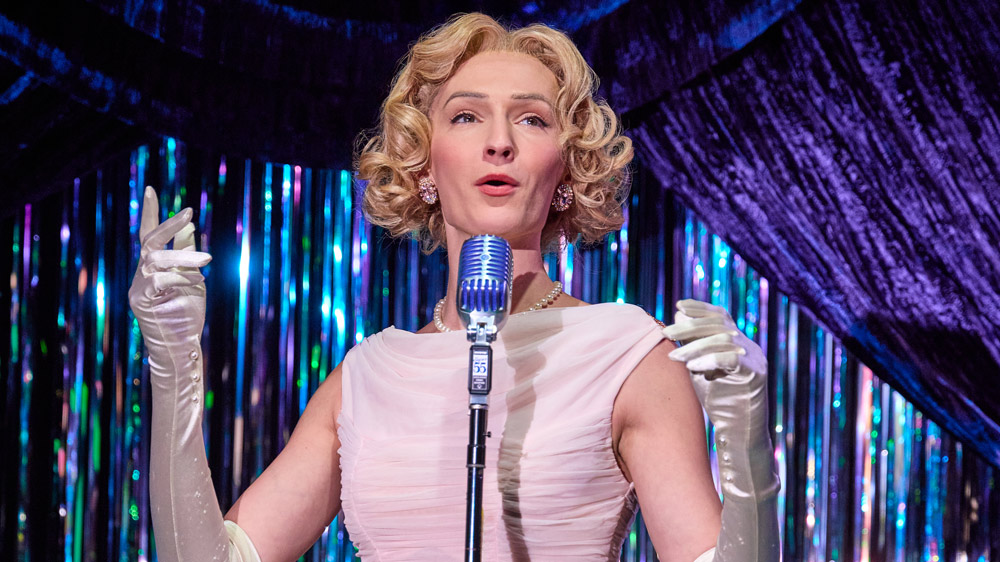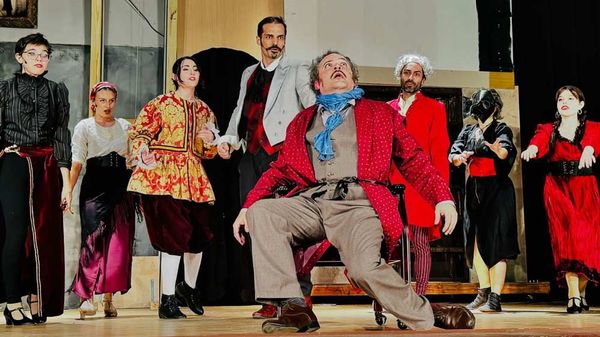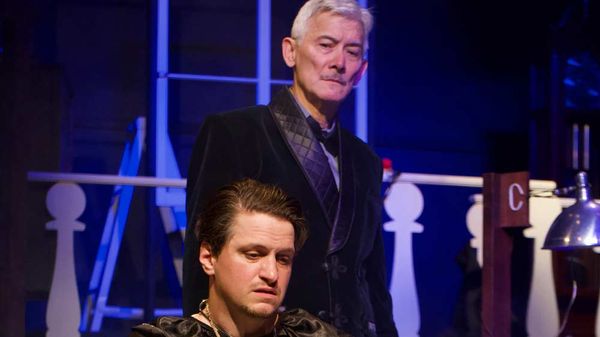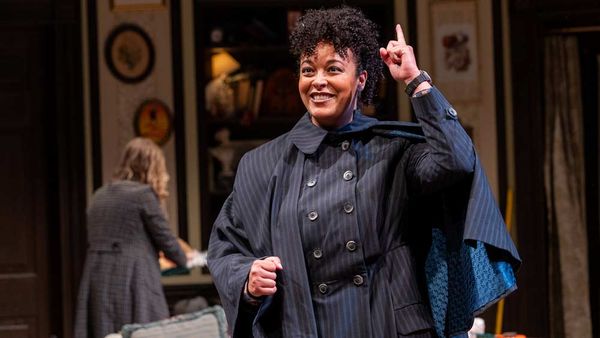
Aug 5
Review: Commonwealth Shakespeare Company Makes Dramatic, Comic Sense of 'The Winter's Tale'
Kilian Melloy READ TIME: 5 MIN.
The Commonwealth Shakespeare Company's production of "The Winter's Tale" leaned into both the tragic and comedic dimensions of a play that can too easily feel disjointed, but it felt whole and successful in this telling.
Produced in the open air of the Boston Common, the production was directed by Bryn Boice, who honored the play's disparate parts, creating a suspenseful, heartrending atmosphere in a first half marked by escalating paranoia, and then leavened the evening with a colorful, dance-rave vision in the show's more light-hearted second half.
King Leontes of Sicily (Nael Nacer) and King Polixenes of Bohemia (Omar Robinson) have been close friends sharing a brotherly bond since childhood. But when Leontes' pregnant wife, Hermione (Marianna Bassham), convinces Polixenes to extend his already-long visit, a worm of worry starts to gnaw at Leontes; is he imagining it, or is the affection between Hermione and Polixenes more than friendly... a lot more than friendly?
It isn't, but a QAnon-like fever quickly envelops Leontes, making him immune to sense, reason, and the strongest persuasion from noble court member Paulina (Paula Plum), Hermione herself, or even trusted adviser Camillo (Tony Estrella). In a fury, Leontes declares Hermione an adulteress, voices his conviction that their unborn child is Polixenes' bastard, and orders that the King of Bohemia be murdered.
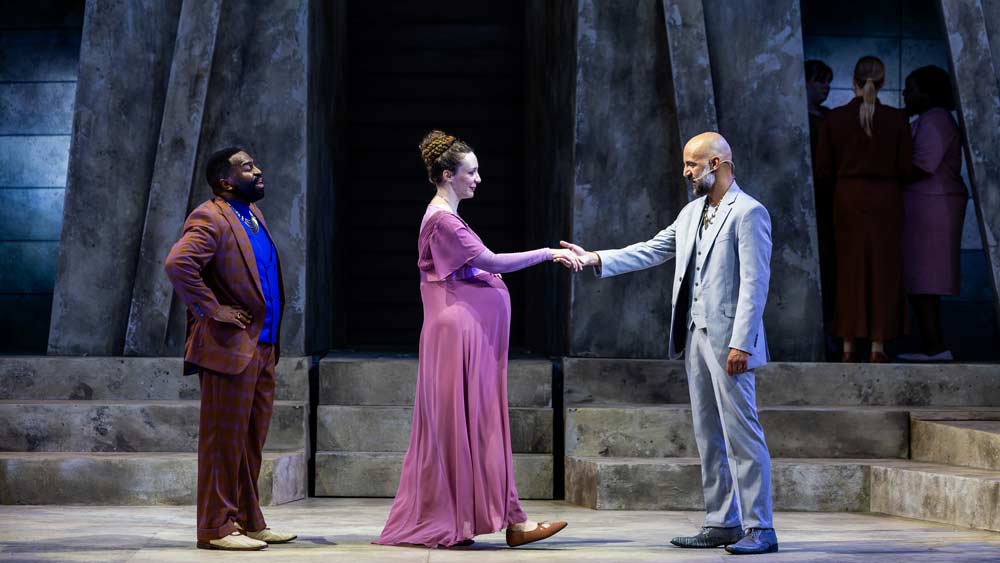
Source: Nile Scott Studios
Camillo, seeing only one way to mitigate an inevitable tragedy, warns Polixenes of the threat to his life and accepts a position in Polixenes' court in return. After the two have fled to Bohemia, Leontes orders Hermione imprisoned and the newborn child abandoned in some remote place, and rejects even the word of the sacred oracle of Apollo confirming that Hermione and Polixenes are blameless, incurring divine wrath that leads to the death of both his son and his innocent wife.
By the time Leontes regains his senses, however, the faithful Antigones (Robert Walsh) has taken the baby away to the shores of Bohemia, where he leaves her to be found, together with a chest of gold. The anger of the gods finds him there, though, and he forfeits his life in a bear attack even as a brutal storm destroys his ship. Only the baby survives the night's horrors, and she is soon found by a shepherd (Richard Snee) and his son, Clown (Cleveland Nicoll).
Here's where things pivot from tragedy to comedy, and jump ahead 16 years (with Paula Plum doubling as Time in a monologue that's so ethereally staged you can well believe a celestial being is filling you in). Soon the irrepressible party animal and rapscallion Autolycos (Ryan Winkles) enters the story, robbing the amiable Clown blind during a cleverly staged exchange and plotting even more felonious activity. Meanwhile, Perdita, the abandoned child of Leontes and Hermione (Clara Hevia), has grown into a beautiful young woman and captured the heart of Polixenes' son, Prince Florizel (Joshua Olumide)... a turn of events that Polixenes does not welcome, and only discovers by infiltrating a raucous Sheep Shearing party that everyone in the countryside seems to attend. His fury, and threats of dire punishment, are enough to drive the youngsters to Sicily, where they intend to seek shelter with the now-repentant Leontes. More fun, of course, ensues.

Source: Nile Scott Studios
Boice shies away from nothing, and that's the right choice; if the play's more overt theme is how Time changes our perspective and heals old wounds, Boice's subtler observation would seem to be the naturalistic ways in which even the most tragic circumstances can prepare the way for joyous things later on. Happiness and harmony can flower even after upheavals of great social and political discord, and that's a comforting notion in these times.
The play's cast is perfection, from Nacer's hugely passionate (and massively mistaken) Leontes to Estrella's fussy and clever Camillo, Olumide's smitten Florizel, Nicoll and Snee as the dynamically comedic duo of Shepherd and Clown, and Winkles' Loki-esque con artist with a sense of duty. Paula Plum is magnificent as Paulina, and unforgettable as Time, while Actors Shakespeare Company stalwarts Walsh, Robinson, and Bassham shine as Antogonus, Polixenes, and the solidly dignified Hermione.
The design team do equally heroic work: James J. Fenton's set is multi-layered, multi-leveled, and full of continuous surprises. Costume designer Rachel Padula-Shufelt clearly had fun working double duty as she envisioned the folks of two very different kingdoms – the formal, almost stuffy, Sicilians, and the fun-loving Bohemians, who certainly live up to the name here. David Remidios' sound design ensured that the outdoor venue lost nothing in terms of audibility, either in dialogue or in the imaginative and well-produced music.
CSC has done it again, creating magical evenings on the Boston Common and making Shakespeare feel as much a part of our time and our vernacular as he was to the theatergoers of 17th century London. All credit to Boice, though, in noting that under her direction, this famous "problem play" feels entirely right.
Kilian Melloy serves as EDGE Media Network's Associate Arts Editor and Staff Contributor. His professional memberships include the National Lesbian & Gay Journalists Association, the Boston Online Film Critics Association, The Gay and Lesbian Entertainment Critics Association, and the Boston Theater Critics Association's Elliot Norton Awards Committee.
